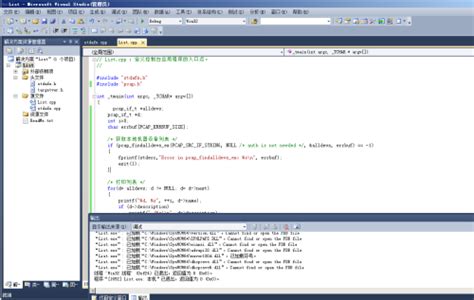winpcap开发
Title: Practical WinPcap Programming Examples
Practical WinPcap Programming Examples
WinPcap, short for Windows Packet Capture, is a powerful library used for network packet capturing and analysis on Windows platforms. It provides developers with a set of functions and utilities to capture and interact with network traffic at a low level. Below are some practical WinPcap programming examples:
To capture network packets using WinPcap, you first need to open a network adapter for capturing. Here's a simple example:
```c
include
int main() {
pcap_t *handle;
char errbuf[PCAP_ERRBUF_SIZE];
// Open the first available network adapter
handle = pcap_open_live("\\Device\\NPF_{ADAPTER_GUID}", BUFSIZ, 1, 1000, errbuf);
if (handle == NULL) {
fprintf(stderr, "Error opening adapter: %s\n", errbuf);
return 1;
}
// Start capturing packets
pcap_loop(handle, 0, packet_handler, NULL);
pcap_close(handle);
return 0;
}
// Callback function to process captured packets
void packet_handler(u_char *param, const struct pcap_pkthdr *header, const u_char *pkt_data) {
// Process packet data here
}
```
WinPcap allows you to filter captured packets based on various criteria using Berkeley Packet Filter (BPF) syntax. Here's an example of capturing only TCP packets:
```c
include
int main() {
// Same initialization code as before
// Compile the filter expression
struct bpf_program fp;
char filter_exp[] = "tcp";
bpf_u_int32 net;
if (pcap_compile(handle, &fp, filter_exp, 0, net) == 1) {
fprintf(stderr, "Error compiling filter: %s\n", pcap_geterr(handle));
return 1;
}
// Apply the compiled filter
if (pcap_setfilter(handle, &fp) == 1) {
fprintf(stderr, "Error setting filter: %s\n", pcap_geterr(handle));
return 1;
}
// Start capturing packets

pcap_loop(handle, 0, packet_handler, NULL);
pcap_close(handle);
return 0;
}
```
With WinPcap, you can also inject custom packets into the network. Here's an example of injecting an ICMP echo request:
```c
include
int main() {
// Same initialization code as before
// Create an ICMP echo request packet
char packet_data[] = "\x08\x00\x7d\x4b\x00\x01\x00\x00\x70\x6f\x6e\x67\x00\x00\x00\x00"
"\x00\x00\x00\x00\x10\x11\x12\x13\x14\x15\x16\x17\x18\x19\x1a\x1b"
"\x1c\x1d\x1e\x1f\x20\x21\x22\x23\x24\x25\x26\x27\x28\x29\x2a\x2b"
"\x2c\x2d\x2e\x2f\x30\x31\x32\x33\x34\x35";
// Inject the packet into the network
if (pcap_sendpacket(handle, (const u_char *)packet_data, sizeof(packet_data)) != 0) {
fprintf(stderr, "Error sending packet: %s\n", pcap_geterr(handle));
return 1;
}
pcap_close(handle);
return 0;
}
```
These are just a few examples of what you can achieve with WinPcap. Remember to include the necessary header files and link against the WinPcap library when compiling your program.
